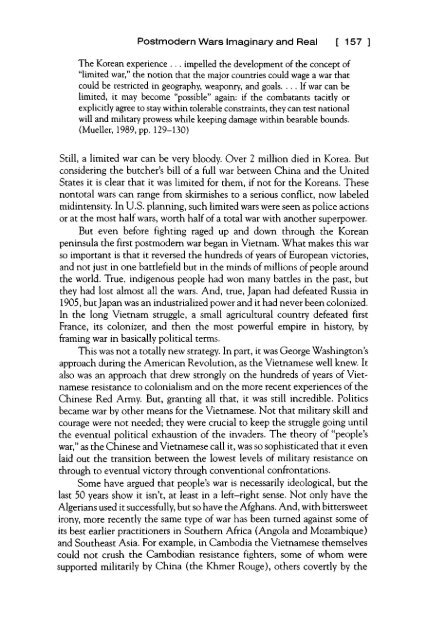Postmodern Wars Imaginary and Real: World War III - Chris Hables ...
Postmodern Wars Imaginary and Real: World War III - Chris Hables ...
Postmodern Wars Imaginary and Real: World War III - Chris Hables ...
Create successful ePaper yourself
Turn your PDF publications into a flip-book with our unique Google optimized e-Paper software.
<strong>Postmodern</strong> <strong><strong>War</strong>s</strong> <strong>Imaginary</strong> <strong>and</strong> <strong>Real</strong> [ 157 ]<br />
The Korean experience . . . impelled the development of the concept of<br />
"limited war," the notion that the major countries could wage a war that<br />
could be restricted in geography, weaponry, <strong>and</strong> goals. ... If war can be<br />
limited, it may become "possible" again: if the combatants tacitly or<br />
explicitly agree to stay within tolerable constraints, they can test national<br />
will <strong>and</strong> military prowess while keeping damage within bearable bounds.<br />
(Mueller, 1989, pp. 129-130)<br />
Still, a limited war can be very bloody. Over 2 million died in Korea. But<br />
considering the butcher's bill of a full war between China <strong>and</strong> the United<br />
States it is clear that it was limited for them, if not for the Koreans. These<br />
nontotal wars can range from skirmishes to a serious conflict, now labeled<br />
midintensity. In U.S. planning, such limited wars were seen as police actions<br />
or at the most half wars, worth half of a total war with another superpower.<br />
But even before fighting raged up <strong>and</strong> down through the Korean<br />
peninsula the first postmodern war began in Vietnam. What makes this war<br />
so important is that it reversed the hundreds of years of European victories,<br />
<strong>and</strong> not just in one battlefield but in the minds of millions of people around<br />
the world. True, indigenous people had won many battles in the past, but<br />
they had lost almost all the wars. And, true, Japan had defeated Russia in<br />
1905, but Japan was an industrialized power <strong>and</strong> it had never been colonized.<br />
In the long Vietnam struggle, a small agricultural country defeated first<br />
France, its colonizer, <strong>and</strong> then the most powerful empire in history, by<br />
framing war in basically political terms.<br />
This was not a totally new strategy. In part, it was George Washington's<br />
approach during the American Revolution, as the Vietnamese well knew. It<br />
also was an approach that drew strongly on the hundreds of years of Vietnamese<br />
resistance to colonialism <strong>and</strong> on the more recent experiences of the<br />
Chinese Red Army. But, granting all that, it was still incredible. Politics<br />
became war by other means for the Vietnamese. Not that military skill <strong>and</strong><br />
courage were not needed; they were crucial to keep the struggle going until<br />
the eventual political exhaustion of the invaders. The theory of "people's<br />
war," as the Chinese <strong>and</strong> Vietnamese call it, was so sophisticated that it even<br />
laid out the transition between the lowest levels of military resistance on<br />
through to eventual victory through conventional confrontations.<br />
Some have argued that people's war is necessarily ideological, but the<br />
last 50 years show it isn't, at least in a left-right sense. Not only have the<br />
Algerians used it successfully, but so have the Afghans. And, with bittersweet<br />
irony, more recently the same type of war has been turned against some of<br />
its best earlier practitioners in Southern Africa (Angola <strong>and</strong> Mozambique)<br />
<strong>and</strong> Southeast Asia. For example, in Cambodia the Vietnamese themselves<br />
could not crush the Cambodian resistance fighters, some of whom were<br />
supported militarily by China (the Khmer Rouge), others covertly by the








